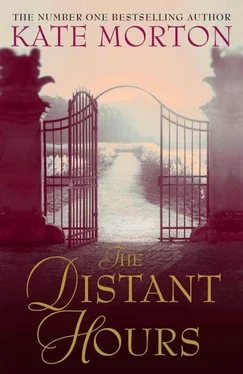I flipped over the letter, ran my hand across Adam Gilbert’s cover sheet, and sank into this most thrilling moment. I believe I may actually have smiled as I turned the page; I certainly bit my lip. Rather too hard, which is how I remember it so well.
Four hours later I’d read it all and I was no longer sitting in a quiet office in London. I was of course, but also I was not. I was many miles away inside a dark and knotty castle in Kent, with three sisters, their larger-than-life Daddy, and a manuscript that was yet to become a book that was yet to become a classic.
I laid down the transcripts, pushed back from my desk and stretched. Then I stood and stretched some more. A kink had tied itself at the base of my spine – I’m told reading with one’s feet crossed atop the desk can do that – and I struggled to dislodge it. Time and a little space allowed certain thoughts to rise from the ocean floor of my mind, and two things in particular floated to the surface. First up, I was awestruck by Adam Gilbert’s workmanship. The notes had clearly been transcribed verbatim from taped interviews and prepared on an old-fashioned typewriter, with impeccable handwritten annotations where necessary, and a level of detail so that they read more like play scripts than interviews (complete with bracketed stage directions if any of his subjects so much as scratched); which is probably why the other thought struck me so strongly: there had been a notable omission. I knelt on my chair and leafed again through the stack to con- firm, checking both sides of the paper. There was nothing from Juniper Blythe.
I drummed my fingers slowly on the stack of notes: there were perfectly good reasons why Adam Gilbert might have passed her over. There was more than enough material without additional comment, she hadn’t even been alive when the Mud Man was first published, she was Juniper… Nonetheless, it niggled. And when things niggle, the perfectionist in me starts to fret. And I don’t much like to fret. There were three Sisters Blythe. Their story, therefore, should not – could not – be written without Juniper’s voice.
Adam Gilbert’s contact details were typed at the bottom of his cover sheet and I deliberated for around ten seconds – just long enough to wonder whether nine thirty was too late to ring somebody whose home address was Old Mill Cottage, Tenterden – before reaching for the phone and dialling his number.
A woman picked up and said: ‘Hello. Mrs Button speaking.’
Something about the slow, melodic tone of her voice reminded me of those wartime movies with the rows of phone operators working the switchboard. ‘Hello,’ I said. ‘My name’s Edie Burchill, but I’m afraid I might have called the wrong number. I was looking for Adam Gilbert.’
‘This is Mr Gilbert’s residence. This is his nurse speaking, Mrs Button.’
Nurse. Oh dear. He was an invalid. ‘I’m so sorry to bother you this late. Perhaps I ought to call back another time.’
‘Not at all. Mr Gilbert is still in his study; I see the light beneath the door. Quite against doctor’s orders, but so long as he keeps off his bad leg there’s not much I can do. He’s rather stubborn. Just a minute and I’ll transfer your call.’
There was a heavy plastic clunk as she laid down the receiver, and the steady sound of footsteps retreating. A knock on a distant door, a murmured exchange, then a few seconds later, Adam Gilbert picked up.
There was a pause after I introduced myself and my purpose, in which I apologized some more for the awkward way in which we’d entered each other’s orbit. ‘I didn’t even know about the Pippin Books edition until today. I’ve no idea at all why Percy Blythe would put her foot down like that.’
Still he didn’t speak.
‘I’m really very, very sorry. I can’t explain it; I’ve only met her once before and then only briefly. I certainly never meant for this to happen.’ I was jabbering, I could hear it, so with great force of will I stopped.
Finally he spoke, in a world-weary sort of voice. ‘All right then, Edie Burchill. I forgive you for stealing my job. One condition, though. If you find out anything to do with the Mud Man ’s origins you tell me first.’
My dad would not be pleased. ‘Of course.’
‘Right then. What can I do for you?’
I explained that I’d just read through his transcript, I complimented him on the thoroughness of his notes, and then I said, ‘There’s one little thing I’m wondering, though.’
‘What’s that?’
‘The third sister, Juniper. There’s nothing here from her.’
‘No,’ he said. ‘No, there’s not.’
I waited, and when nothing followed I said, ‘You didn’t speak with her?’
‘No.’
Again I waited. Again nothing followed. Apparently this was not going to be easy. At the other end of the line he cleared his throat and said, ‘I proposed to interview Juniper Blythe but she wasn’t available.’
‘Oh?’
‘Well, she was available in a bodily sense – I don’t think she leaves the castle much – but the older sisters wouldn’t permit me to speak with her.’
Comprehension dawned. ‘Oh.’
‘She’s not well, so I expect that’s all it was, but…’
‘But what?’
A break in conversation during which I could almost see him grabbing for the words to explain himself. Finally, a brambly sigh. ‘I got the feeling they were trying to protect her in some way.’
‘Protect her from what? From whom? From you ?’
‘No, not from me!’
‘Then what?’
‘I don’t know. It was just a feeling. As if they were worried about what she might say. How it might reflect.’
‘On them? On their father?’
‘Maybe. Or else on her.’
I remembered then the strange feeling I’d got when I was at Milderhurst, the glance that had passed between Saffy and Percy when Juniper shouted at me in the yellow parlour; Saffy’s concern when she discovered that Juniper had wandered off, that she’d been talking to me in the passage. That she might have said something she shouldn’t. ‘But why?’ I said, more to myself than to him, thinking about Mum’s lost letter, the trouble hinted at between its lines. ‘What could Juniper possibly have to hide?’
‘Well,’ said Adam, lowering his voice a little, ‘I must admit to having done a bit of digging. The more adamant they were about keeping her out of it, the more interested I got.’
‘And? What did you find?’ I was glad he couldn’t see me. There was no dignity in the way I was practically swallowing the telephone receiver in my eagerness.
‘An incident in 1935; I guess you could call it a scandal.’ He let the final word hang between us with a sort of mysterious satisfaction, and I could just picture him: leaning back against his bentwood desk chair, smoking jacket drawn taut against his belly, warm pipe clamped between his teeth.
I matched his hushed tone. ‘What sort of scandal?’
‘Some “bad business” is what I was told, involving the son of an employee. One of the gardeners. The details were all rather imprecise and I couldn’t find anything of an official nature to verify it, but the story goes that the two of them were involved in some sort of a scrap and he came out of it beaten black and blue.’
‘By Juniper ?’ An image came to mind of the wisp of old woman I’d met at Milderhurst; the slender girl in the old photos. I tried not to laugh. ‘When she was thirteen years old?’
‘That was the implication, though saying it out loud like that makes it seem rather far-fetched.’
‘But that’s what he told people? That Juniper did it?’
‘Well, he didn’t say any such thing. I can’t imagine there are too many young fellows who’d admit freely to being bested by a slim young girl like her. It was his mother who went up to the castle making claims. From what I hear, Raymond Blythe paid them off. Dressed up as a bonus for his father, apparently, who’d worked his whole life on the estate. The rumour didn’t go away, though, not completely; there was still talk in the village.’
Читать дальше












